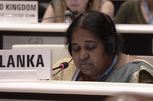Alcohol brought up in WHA NCD debate
A number of interventions by Member States of the World Health Organization emphasized the need to address alcohol in the recent debate about non-communicable diseases (NCDs) at the World Health Assembly (WHA) in Geneva in May.
Sri Lanka, speaking on behalf of 11 countries of the South East Asia Region of WHO (SEARO), pointed to the considerable harm caused by alcohol, both in their region and in the world. Said the representative from Sri Lanka: “In the context of the preparation for the UN HLM on the prevention and control of NCDs in 2018, 11 member states of South East Asia believe harmful use of alcohol is a major issue in need of urgent attention. The last Expert Committee on this topic met in 2006 and the situation has changed markedly since then especially with regard to cross- border marketing including in the social media. Therefore, SEARO member states request the DG to initiate and resource an Expert Committee to report on alcohol control situation and progress prior to the UNHLM in 2018.”
The request for a new Expert Committee was also supported in a statement by Estonia on behalf of the three Baltic states. Referring to the intervention from Sri Lanka, Estonia said “We share their concerns. The harmful use of alcohol clearly needs more attention at the WHO level.” Estonia pointed to the side event on “Alcohol marketing in the digital age”, that they co-sponsored in last year’s WHA.
Norway and Botswana also supported Sri Lanka’s proposal for a new Expert Committee to be set up by WHO. In the debate several countries, including Thailand, Liberia, Vietnam, Zambia, Panama, Canada, Nigeria, Uruguay, Brazil, and Surinam mentioned alcohol in the NCD context.
While Ghana, speaking on behalf of the 47 countries of the African Region, did not specifically mention alcohol, their interventions included concerns about underfunding and industry interference: “The glaring and continued underfunding of work to accelerate implementation of NCD prevention and control measures in the region needs to be addressed, particularly in the area of industry interference that block measures to implement domestic taxes on health-harming products in order to ensure the self-financing of national responses.”
RELATED ARTICLES
- New report highlights benefits of policy measures to prevent harmful alcohol consumption
- WHO consultation on global alcohol strategy and the way forward
- Alcohol use - a barrier to health and to the achievement of the SDGs
- Government investments in alcohol industry up against the wall
- Abstracts for GAPC 2020 – deadline 29 July 2019
- A regional African alcohol coordination mechanism is needed
- New book reveals a series of unethical business practices by Heineken in Africa
- SAAPA applauds WHO position on no industry collaboration
- Next GAPC to be held in Dublin in March 2020
- SAFER – a new WHO initiative to boost national alcohol policy processes

